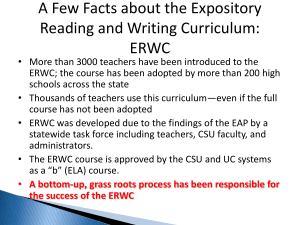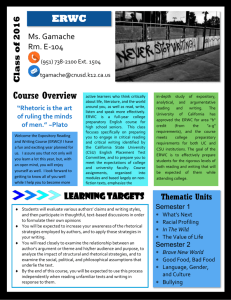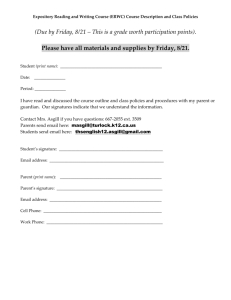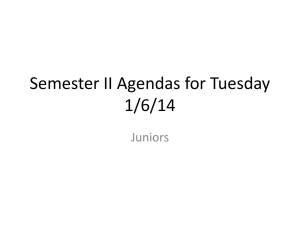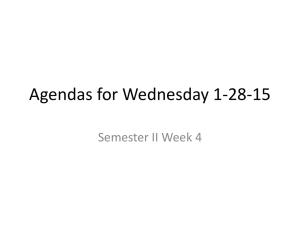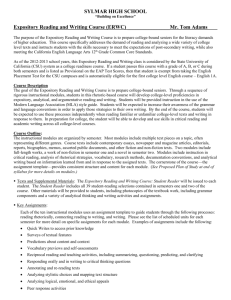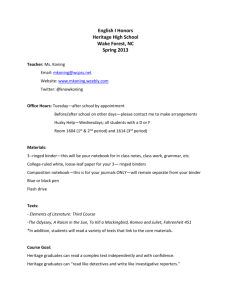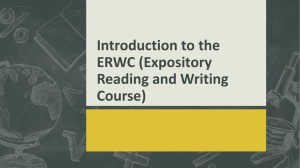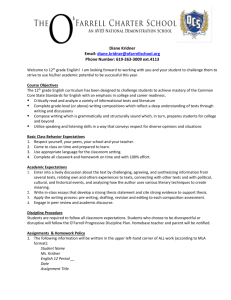ERWC English 12 Course Syllabus Mr. Baker La Habra High School
advertisement
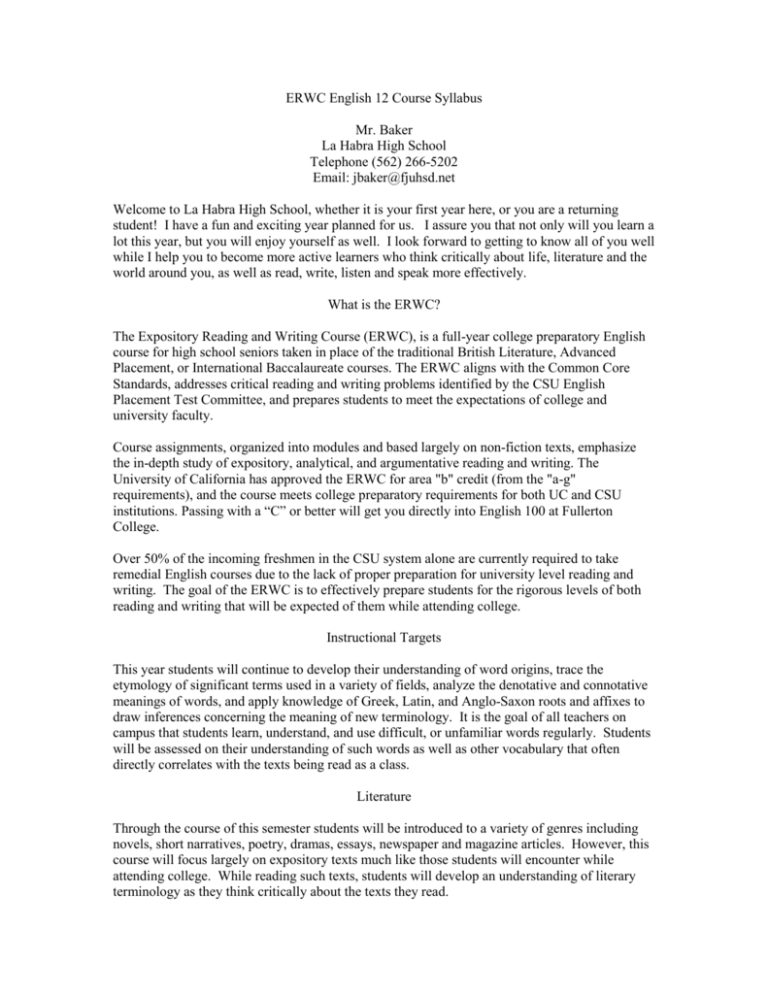
ERWC English 12 Course Syllabus Mr. Baker La Habra High School Telephone (562) 266-5202 Email: jbaker@fjuhsd.net Welcome to La Habra High School, whether it is your first year here, or you are a returning student! I have a fun and exciting year planned for us. I assure you that not only will you learn a lot this year, but you will enjoy yourself as well. I look forward to getting to know all of you well while I help you to become more active learners who think critically about life, literature and the world around you, as well as read, write, listen and speak more effectively. What is the ERWC? The Expository Reading and Writing Course (ERWC), is a full-year college preparatory English course for high school seniors taken in place of the traditional British Literature, Advanced Placement, or International Baccalaureate courses. The ERWC aligns with the Common Core Standards, addresses critical reading and writing problems identified by the CSU English Placement Test Committee, and prepares students to meet the expectations of college and university faculty. Course assignments, organized into modules and based largely on non-fiction texts, emphasize the in-depth study of expository, analytical, and argumentative reading and writing. The University of California has approved the ERWC for area "b" credit (from the "a-g" requirements), and the course meets college preparatory requirements for both UC and CSU institutions. Passing with a “C” or better will get you directly into English 100 at Fullerton College. Over 50% of the incoming freshmen in the CSU system alone are currently required to take remedial English courses due to the lack of proper preparation for university level reading and writing. The goal of the ERWC is to effectively prepare students for the rigorous levels of both reading and writing that will be expected of them while attending college. Instructional Targets This year students will continue to develop their understanding of word origins, trace the etymology of significant terms used in a variety of fields, analyze the denotative and connotative meanings of words, and apply knowledge of Greek, Latin, and Anglo-Saxon roots and affixes to draw inferences concerning the meaning of new terminology. It is the goal of all teachers on campus that students learn, understand, and use difficult, or unfamiliar words regularly. Students will be assessed on their understanding of such words as well as other vocabulary that often directly correlates with the texts being read as a class. Literature Through the course of this semester students will be introduced to a variety of genres including novels, short narratives, poetry, dramas, essays, newspaper and magazine articles. However, this course will focus largely on expository texts much like those students will encounter while attending college. While reading such texts, students will develop an understanding of literary terminology as they think critically about the texts they read. Writing and Grammar The writing process will be thoroughly addressed and explored throughout the semester to ensure all students continue to develop their writing skills using proper English and grammar. Writing is an integral part of this course and will be done almost on a daily basis. Students can expect to complete journals, timed writing, literary responses, persuasive and expository writing. Major writing assignments will include a brainstorm, outline, rough draft, revision, and final draft. Likewise, students will participate in Writers’ Workshops where they will give and receive valuable feedback from their peers. Listening and Speaking In order to become the most effective communicators possible, students must practice both their listening and speaking skills. Whether it is communicating with a partner, small groups, or in front of larger audiences, all students will be expected to deliver and orally present an array of information to others and the entire class. At the same time, students will learn how to become active listeners during oral presentations. Assessments Students enrolled in this course will be assessed in a variety of ways. Common assessments for reading will include written responses (short answer and/or developed essays), student/teacher conferences, class and group discussion, and journal responses. Assessments for writing will include the use of rubrics made available to students and discussed before, during, and after writing. Vocabulary and grammar will be assessed through the use of several activities, exercises, tests and application through writing. Students are assessed through state content standards, collegiate expectations, as well as work habits. Necessary and Recommended Materials (Items 1, 2 and 5 are mandatory) 1. A college composition book is a must. All smaller class assignments will be written in the comp book and I will collect the comp books for grading every three weeks. 2. A 1 ½” or 2” binder with dividers. ERWC is taught through a series of modules. I will provide you with the modules, but it is up to you to keep them organized in a binder. 3. A pack of index cards (3x5 or 5x7) will help you study for the vocabulary tests. 4. Highlighters (2-3 of varying colors) will help you close read the articles. 5. Blue/Black pens only. Classroom Expectations 1. 2. 3. 4. 5. No electronic devices may be used, or visible in the classroom. This includes, but is not limited to cell phones and mp3 players. Such items will be confiscated and a parent will be required to pick them up in the Assistant Principal’s office. No food or drink may be consumed within the classroom. Bottled water is the only exception. Students must be in their seats before the bell rings each day. The school-wide tardy policy will be strongly enforced. Only ask to use the restroom during appropriate times, not during instructional time. Restroom passes will only be permitted for emergencies. Remember to use the restroom before class, during break, lunch and passing periods. Always clean your desk and the area around it before leaving class each day. 6. 7. 8. 9. DO NOT PLAGERIZE. Plagiarism of any kind will earn you a zero on the assignment, a referral, and a conference with your parents/legal guardians. Be prepared for class each day and bring expected materials. No late work will be accepted on major assignments. All students who will be absent on the due dates of essays and major projects must either drop the assignment off in the teacher’s box, be delivered via another student, or be emailed to the teacher at the time the assignment is due, and on the date the assignment is due. If you email an assignment, you must also bring me the hard copy when you return to school. I will not print your papers, nor will I grade papers from email. Papers emailed to me are just to show me that you completed them on time. Be respectful to the teacher, classmates, and all visitors. Work hard and have fun! Let’s all do our part to make this a fantastic year. Again, I look forward to working with you. Please feel free to contact me any time at the school, or through e-mail. Sincerely, Mr. Baker --------------------------------------------------------------------------------------------------------------------Please sign below to confirm you have read this syllabus with your child. The additional information is appreciated and will be used to contact you more easily if necessary. Student Name (print): ___________________ Student Signature: ________________________ Parent Name (print): ____________________ Parent Signature: _________________________ Phone Number: _____________________ Parent Email: _______________________________
